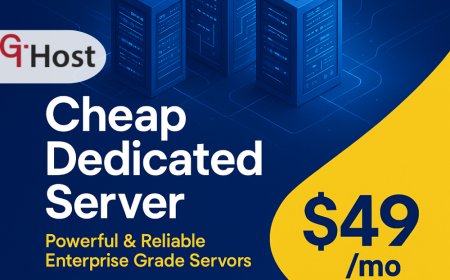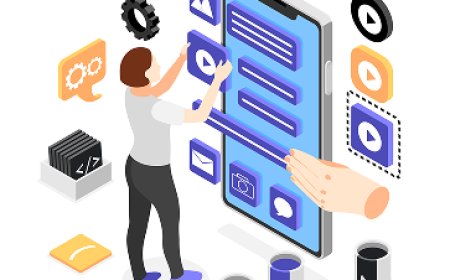Custom LLMs Explained: Why Today’s Enterprises Are Ditching Off-the-Shelf AI

In the rapidly evolving landscape of artificial intelligence, one trend stands out among forward-thinking companies: the rising investment in custom Large Language Model (LLM) development services. From automating internal workflows to enhancing customer experience and driving innovation, custom LLMs are becoming indispensable tools for enterprises aiming to stay competitive in 2025 and beyond.
While off-the-shelf LLM solutions like ChatGPT and Claude offer powerful capabilities, they often fall short when it comes to aligning with an organizations specific goals, data needs, and compliance requirements. This gap has led many businesses to pursue tailor-made LLM development services that are optimized for their unique workflows, industry demands, and long-term strategies.
Lets explore why custom LLM development is now a critical investment for companies across industriesand what it means for the future of AI adoption.
The Limitations of Off-the-Shelf LLMs
Off-the-shelf LLMs are great for general use cases, but they come with constraints that limit enterprise adoption in certain domains. These models are trained on public datasets, and while they can provide impressive general language capabilities, they struggle with:
-
Domain-specific knowledge: They often lack context around specialized terminology in industries like legal, finance, or healthcare.
-
Data privacy concerns: Public LLMs may not meet internal data handling, security, or compliance needs.
-
Limited control: Companies cant fine-tune or extend model capabilities to fit proprietary processes or logic.
-
Generic outputs: The lack of personalization often leads to low relevance or alignment with brand tone, customer context, or specific operational workflows.
As companies scale their AI efforts, they need models that deeply understand their operations and can evolve with them. This is where custom LLM development services enter the picture.
Custom LLMs: Tailored to Fit Business Needs
Custom LLM development allows organizations to build models that are trained on their own datasets, integrate seamlessly with existing software, and address very specific tasks. These LLMs can be designed to follow particular business rules, support multilingual requirements, and deliver high-precision results for mission-critical applications.
Personalized Workflows
A custom LLM can be tailored to handle unique workflowswhether its analyzing thousands of legal contracts, generating hyper-personalized marketing copy, or assisting customer service agents with real-time knowledge retrieval. This kind of specificity is nearly impossible with generic LLMs.
Enhanced Performance
When trained on proprietary datasets, custom LLMs significantly outperform general models on niche use cases. They understand organizational terminology, workflows, and customer interactionsleading to better predictions, more accurate outputs, and ultimately, higher productivity.
Seamless Integration
Custom models can be built to integrate tightly with a companys tech stackERP systems, CRMs, document repositories, and even internal APIs. This allows companies to deploy LLMs not just as standalone assistants, but as core components of digital infrastructure.
Key Business Drivers Behind the Investment
Lets look at the top reasons why companies are increasingly turning to custom LLM development services in 2025.
1. Competitive Differentiation
AI is no longer a buzzwordits a key differentiator. Companies that leverage LLMs to create unique customer experiences or optimize operations gain a real edge. With a custom LLM, businesses can offer features or services that competitors using standard models simply cant match.
For example, a custom-trained LLM in eCommerce could generate personalized product descriptions, SEO content, and chat support tailored to a brands voice and buyer personassomething a general LLM cannot consistently deliver.
2. Data Ownership and Security
As data regulations like GDPR, HIPAA, and Indias DPDP Act become stricter, companies must be cautious about how and where their data is processed. Custom LLMs, especially those developed for on-premises or private cloud environments, offer full data control.
This ensures sensitive internal data doesnt leave the companys infrastructure while still allowing AI to add value. It also reduces dependency on external SaaS vendors, mitigating third-party risk.
3. Cost Efficiency at Scale
Although custom LLM development requires an initial investment, it becomes more cost-effective at scale. Businesses no longer pay per token or API call to third-party platforms. Instead, they gain a reusable asset that can be deployed across multiple departments, from customer service to legal, HR, marketing, and operations.
In fact, once developed, a custom LLM can be fine-tuned incrementally with minimal cost to support new functions or user rolesmaximizing long-term ROI.
4. Strategic Control Over AI Capabilities
With public models, businesses are at the mercy of third-party update cycles, model versions, or feature restrictions. Custom development gives enterprises full strategic control over model architecture, fine-tuning frequency, interface design, and output formats.
This control is especially valuable for companies in regulated industries or those that require explainable AI outputs for auditing and compliance.
5. Cross-Functional Automation
Custom LLMs are versatile. A single base model can be adapted for multiple departments. For example:
-
In HR, it can summarize resumes and generate interview questions.
-
In finance, it can analyze contracts and detect discrepancies.
-
In legal, it can extract key clauses from long agreements.
-
In sales, it can draft client proposals in minutes.
-
In support, it can offer contextual responses from company knowledge bases.
This level of internal automation isnt just cost-savingits transformative.
Use Cases Driving Adoption
Lets look at real-world scenarios where companies are seeing tangible benefits from investing in custom LLMs.
Legal and Compliance
Law firms and legal departments use LLMs trained on case law, internal documentation, and policy frameworks to assist with contract analysis, regulatory compliance checks, and legal research.
Custom models significantly cut down time spent on manual review and reduce the risk of overlooking key clauses or compliance issues.
Healthcare and Life Sciences
In healthcare, custom LLMs are trained on clinical data, EMRs, and research journals to support faster diagnostics, patient communication, and research summarizationall while ensuring HIPAA compliance.
Pharmaceutical companies use them to analyze medical literature and streamline drug discovery processes.
Finance and Insurance
Financial institutions use custom models to generate reports, review risk assessments, assist with fraud detection, and respond to customer queriesall with high accuracy and in a compliant manner.
These models can also be integrated with KYC/AML systems to flag unusual patterns and speed up customer onboarding.
Retail and eCommerce
Brands are leveraging custom LLMs for hyper-personalized marketing, automated product tagging, chatbot-driven sales assistance, and voice commerce. Models trained on brand data ensure messaging consistency and deeper customer engagement.
The Technology Stack Behind Custom LLM Development
Building a custom LLM involves a blend of cutting-edge tools and best practices:
-
Model selection: Companies can start from foundational models like LLaMA, Mistral, or Falcon, depending on their scale and licensing needs.
-
Fine-tuning: Using internal datasets, LLMs are fine-tuned to reflect domain-specific language, tone, and context.
-
Reinforcement learning: RLHF (Reinforcement Learning with Human Feedback) can be used to align model outputs with business goals.
-
Deployment: Models can be deployed on-premise, in private clouds, or with edge capabilities for compliance and performance.
-
Monitoring: Continuous evaluation of accuracy, latency, and output quality ensures optimal performance post-deployment.
Many companies partner with LLM development service providers who specialize in this full-stack developmentfrom model selection and training to deployment and maintenance.
Why Now? The Timing Is Right
Several converging trends make 2025 the ideal time to invest in custom LLMs:
-
Open-source LLMs are more powerful and accessible than ever before.
-
GPU costs have declined, making training and inference more affordable.
-
Enterprise AI maturity has improved, with clearer internal processes and governance models in place.
-
Customer expectations are higher, and personalized, AI-driven experiences are becoming the norm.
-
New developer tools for fine-tuning, evaluating, and serving models have matured, reducing development friction.
Together, these factors have lowered the barrier to entry and increased the payoff for custom LLM initiatives.
Conclusion
As AI becomes more deeply integrated into the modern business stack, the limitations of one-size-fits-all models are becoming clear. Companies need smarter, safer, and more context-aware AI toolsones that speak their language, understand their data, and respect their constraints.
Custom LLM development services offer exactly that. By investing in tailored models, organizations unlock the full potential of AI to automate tasks, reduce costs, and deliver exceptional customer and employee experiences.
For businesses looking to lead in the age of AI, the decision is no longer if but how fast they can build and deploy their own LLMs.






























